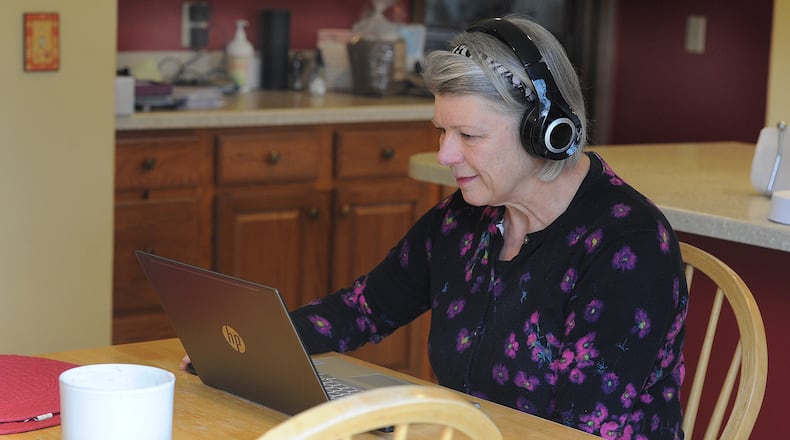The Dayton Mediation Center opened what was likely a record number of cases in 2020, as many people turned to mediation services to help resolve conflicts, which often centers around quality-of-life concerns and issues that in normal times might end up in court.
During the pandemic, some divorced and separated parents clashed over health, safety and schooling decisions.
Neighbors struggled to get along and quarreled over parking, noise, trash, property upkeep and kids’ behaviors. Some renters and property owners sparred over rent and other issues.
“I would say the conflict probably existed prior to the pandemic, but the pandemic certainly has exacerbated the conflict,” said Michelle Zaremba, manager of the Dayton Mediation Center.
However, Zaremba said, the increase in mediation cases may be a good sign that people increasingly are trying to address conflict in a productive and constructive way.
Last year, the Dayton Mediation Center received 2,806 referrals, which was up more than 23% from 2019, according to the center’s data. Referrals to the mediation center have increased four out of the last five years, and officials think last year’s tally was a new record.
The center’s staff and volunteers help people involved in conflict engage in difficult conversations, Zaremba said.
The free mediation sessions provide an opportunity for meaningful communication in a safe environment in which conflicting parties get to say what’s on their mind and hear from the other side, she said.
Conflict is a “crisis in how people talk to each other,” Zaremba said, and mediation helps people communicate in clearer, calmer and more productive ways, which is important for decision-making and figuring out next steps and possible solutions.
Mediation provides people in conflict with an opportunity for empowerment and recognition, said Laurel Kerr, 59, of Centerville, who started mediation training in the fall of 2017.
People in conflict often are defensive and have a hard time seeing things from someone else’s perspective, said Kerr, who is one of about 50 volunteers who facilitate mediation sessions in Dayton.
During mediation, participants hear from the other side but they also get to hear their own words read back to them, which can be illuminating because people often do not realize how they came across during tense interactions and arguments and find out they did not articulate what they wanted to say, she said.
“Through hearing each other and hearing themselves, they can make a shift,” she said.
The pandemic has created stressful conditions that are ripe for conflict.
Many people are unemployed, stuck at home, struggling to pay the bills and have fallen behind on rent or mortgage payments.
Some parents, family members and neighbors don’t see eye-to-eye about what activities are and are not safe during the public health crisis.
“There’s a lot of family and neighbor issues,” Zaremba said. “Everyone is at home, and conflict is inevitable.”
Neighbor disputes accounted for more than 40% of the mediation referrals last year, or about 1,153 cases, according to the center’s data.
About 13% of cases involved landlords and tenants and nearly 8% were about parenting.
Other cases concerned police reform (288), business and contract disputes (140), workplace conflict (28) and divorce and dissolution (19).
Mediation can help with a wide range of issues, including some that often result in litigation, like evictions, small claims and parenting disagreements, Zaremba said.
Juvenile and civil courts and other legal services were limited or slowed down during the COVID-19 crisis, which is why it was very valuable that the mediation center pivoted to offering online mediation services early last year, Zaremba said.
Many people did not want to wait until they could get a day in court to address their issues.
During the coronavirus outbreak, it seems like many people have taken inventory of their lives and have decided its time to finally address long-simmering issues with neighbors, family members, co-workers and other people, Zaremba said.
“This pandemic has offered people an opportunity to get out of their rut and do things differently,” she said.
Mediation can help repair strained relationships and communication breakdowns between landlords and tenants, she said, and sessions also can help parents make level-headed and intentional decisions about visitation and other arrangements and points of contention.
Police calls for service about neighbor disputes dramatically decrease when people take part in mediation and conflict coaching, Zaremba said.
In 2021, the Dayton Police Department plans to encourage police officers during roll-call meetings to make mediation referrals and submit certain types of calls for service to the mediation center automatically for review and follow-up, said Dayton police Lt. Col. Matt Carper, who is the police department’s deputy director and assistant police chief.
“Officers have had a long-term appreciation for the effectiveness of the mediation center, so they continue to make those referrals,” Carper said.
Kerr said the shift to online mediation services offers new opportunities for people to participate because they no longer have to travel or take off work to get involved.
About the Author




